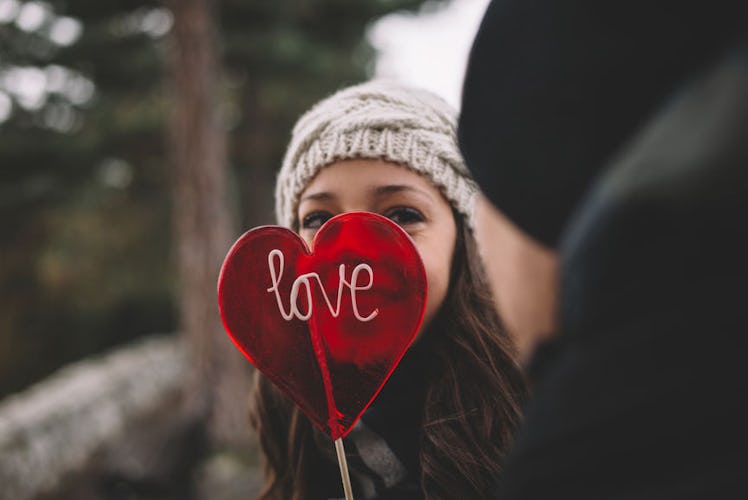
Here's What It Could Mean If Your Partner Is Dreading Valentine's Day, According To Experts
If you’re into a traditional Valentine’s Day, you probably picture all the classic touches — Hallmark cards, a huge bouquet of flowers, and a giant box of chocolates. The day is all about showing off our love for one another, and for some couples, that means going all out. But if your significant other hates Valentine’s Day, things might be a little more complicated, and you may even be feeling stress about the upcoming day of romance.
The great news is that just because your SO isn’t keen on Valentine’s Day, it doesn’t necessarily mean they’re not into you. Dr. LaVerne Hanes Collins, Interim VP for the Foundation & Professional Services Division of the National Board for Certified Counselors, explains that every couple is different. “There are always going to be differences between what two people find important,” she tells Elite Daily. “It is not necessarily a sign of a relationship that is in trouble if you learn early on that the person is not into celebrating things like Valentine’s Day.”
Samantha Burns, relationship coach and author of Breaking Up & Bouncing Back, echoes this statement. “If your partner has never been into romantic gestures, don’t expect them to roll out the red carpet with chocolate and flowers or plan a big surprise just because it’s February 14th, especially if they don’t know how much you care about this holiday,” she tells Elite Daily.
Instead, the concerning thing to look out for is if your partner’s views on Valentine’s Day suddenly change out of the blue. “It might be indicative of issues if after years and years of celebrating Valentine’s Day, abruptly your partner no longer has an interest,” Collins says. “That means something has changed and shifted, and heart to heart conversations may be in order.”
It’s likely that if you grew up understanding Valentine’s Day to be a huge deal, you’ve internalized similar feelings about it as an adult. “Did your parents make V-Day a big deal, giving cards, gifts, creating annual traditions, or even leaving the kids at home for a romantic date night or getaway?” Burns asks. “This may influence your outlook on the holiday, and can also tap into your core beliefs and values about things such as money management, materialism, and even your love languages, which reflect the ways you most like to receive love and affection.” If you’ve always received gifts on big holidays, maybe you consider this a crucial way to give or receive love. Your partner might just have a different perspective, and this probably isn’t something that should be too concerning.
If you’re hoping for a special celebration on Valentine’s Day, it’s important to make your expectations clear from the outset. “The best way to avoid disappointment is to set realistic expectations, which means you should talk about Valentine’s Day with your partner in advance of Feb. 14,” Burns suggests.
Collins also emphasizes the value of intentional conversation. “Your partner is not responsible for the feelings and values and meaning that you came into the relationship with. Don’t use the conversation as a means to try to change them. Make ‘I’ statements that represent you and to do so in a non-blaming, non-judgmental way,” she says. “If you can talk about meaning and value, you are giving your partner a glimpse into your own heart.” Your partner won’t know what’s important to you until you tell them, and odds are, if they care about you, they’ll be happy to try to make the holiday special.
Valentine’s Day is all about celebrating love, and that’s going to be unique to every couple. If you’ve decided that traditional celebration isn’t the way you want to go, there are a ton of alternatives to make your day feel special. Burns suggests thinking about things the two of you love doing together. “Hit up a workout class together, laugh at a comedy show, get artsy at a paint night, volunteer at a soup kitchen, create a scavenger hunt that ends somewhere sentimental, or even throw an ‘anti-Valentine’s Day’ party for you and your friends that also aren’t into the holiday,” she says. Making memories specific to you will make the holiday feel less commercialized and more authentic.
Another unconventional Valentine’s idea would be using the day to make someone else happy. Collins says that acts of kindness for others can actually bring you closer as a couple. “A wonderful alternative is to go and find someone who might not have anyone to give them the extra special attention that Valentine’s Day suggests, and do something for someone else,” she says. “Take a couple dozen roses to elderly ladies and gentlemen at a nursing home. Go to a homeless shelter and do something for those who don’t have validation and affirmation.” This will feel special and can bond you together in the act of showing love for someone else. Then, if you want a day for just the two of you, you can plan something different later on.
The best thing to remember is that just like your love, your Valentine’s Day is going to be unique. “There is no right or wrong, there’s just different,” Collins assures. If you are all about the traditional touches, go for it! Otherwise it’s totally fine to change things up. Your day as a couple should consist of whatever brings you the most fulfillment and joy.